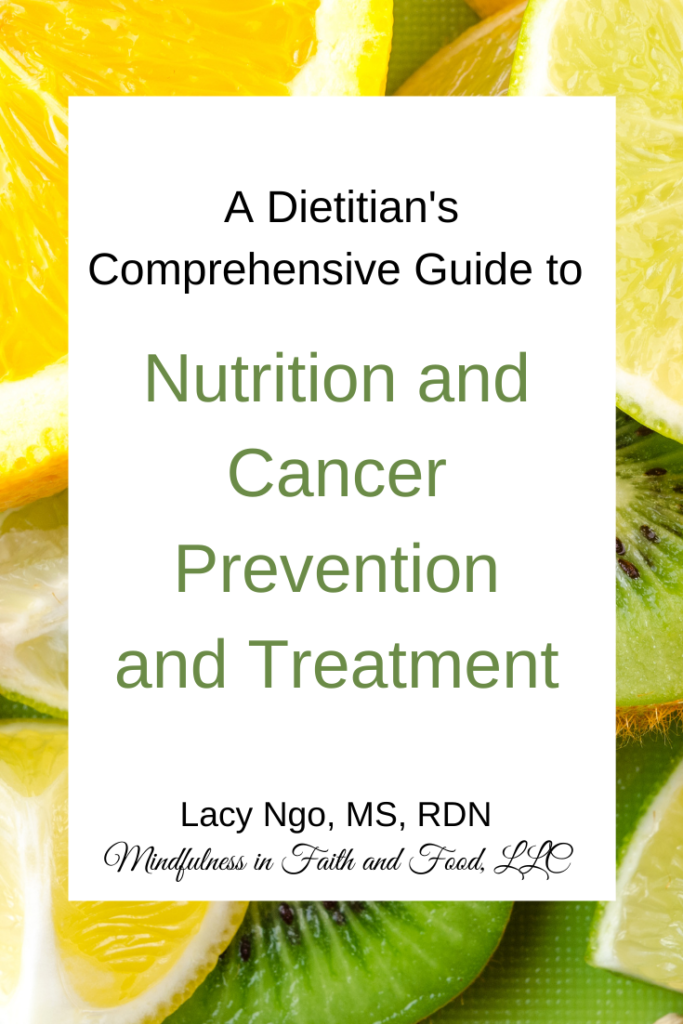An Overview of Cancer Prevention
Cancer Prevention: According to the Pharmaceutical Research Journal, 90-95% of cancer has a root cause in environmental and lifestyle factors with 25-35% linked to tobacco use and 30-35% linked to diet (1). The top Five environmental risk factors linked to cancer include:
- Sedentary life
- Low fruit and vegetable intakes
- Smoking
- Obesity
- Excessive alcohol
This site contains affiliate links (See full disclosure here.)

In fact, according to the World Cancer Report, around one third of all cancer deaths are resulting from low fruit and vegetable intakes, obesity, sedentary lifestyles, tobacco use, and excessive alcohol consumption (3). Evidence also shows that excess weight increased the risk of cancer by 50%.
Cancer Prevention and General Diet
The heavily plant-based Mediterranean diet, in particular, has been looked at as a way to reduce the risk of developing cancer. In fact, many studies show a strong inverse relationship between the level of Mediterranean diet adherence and cancer. The Mediterranean diet is characterized by a high consumption of anti-inflammatory, antioxidant-rich fruits and vegetables as well as other whole foods like whole grains, nuts, seeds, legumes, olive oil, and green tea; a moderate consumption of fish, like salmon; and a moderate to low consumption lean meats. Fiber antioxidants, vegetables, fruits, nuts, seeds, legumes, and green tea have been shown to reduce the risk of cancer and decrease tumor cell growth (1). Omega-3 is also anti-inflammatory so eating a moderate amount of fish, especially salmon and tuna, appear beneficial as well. The Mediterranean diet also is characterized by avoiding or limiting refined carbohydrates and refined and added sugar. Ultra-processed foods, fried foods, and processed meat should be avoided as well. This diet appears to fight cancer due to its anti-inflammatory nature. Another cancer fighting nutrient consumed often with the Mediterranean diet is fiber.
The Keto Diet
Although most evidence points to the benefits of the Mediterranean diet when it comes to reducing the risk of cancer, some studies have found benefits from the Keto diet as well. Some preliminary research suggest that the keto diet may play a role in slowing cancer progression and even decreasing cancer growth (22, 23, 24).
So how do we reconcile the research that says the Mediterranean style diets are beneficial AND the keto diet is beneficial?
The theory is that one the benefit of the keto diet may come from it’s “fasting-like” effects on the body. However, you can get these effects from the Intermittent fasting method as well. The keto diet is also like the MIND and Mediterranean in the fact that all of these diets recommend limiting refined carbohydrates like white bread, sugar, pastries, and soda. It is recommended that the fats you eat on the keto diet come from mostly healthy fats like cold water fish, avocados, grass-fed meat, nuts, seeds, and olive oil. The keto diet also recommends eating lots of low carb vegetables like dark leafy greens. This is in sync with the Mediterranean and MIND diet as well.
There are some foods shown to reduce the risk of cancer that are limited when someone is on the keto diet. These include fruits and probiotic-rich yogurt. Although berries are allowed in moderation on the keto diet, there is strong evidence that berries are protective against cancer and should be eating often.
So what does this Mean? Which diets should we follow?
Perhaps a combination of these diets could be followed in order to include the beneficial aspects of each of these diets. For example, someone could focus on eating a diet full of the vegetables and healthy fats (which are also part of the keto diet and Mediterranean diet), but also include fruits, especially berries as well, which is recommended when someone is on the Mediterranean diet. As for carbohydrates, many people are overeating carbohydrates. So although healthy carbohydrates are beneficial, we should avoid overeating them. If someone wanted the fasting-like benefits of the keto diet, then perhaps they could try intermittent fasting for cancer prevention (although more research is needed). Intermittent fasting and the keto diet are sometimes hard to sustain for many and are not recommended for someone at risk for disordered eating. I do not recommend intermittent fasting if you are currently being treated for cancer. Treatment can decrease appetite so you need to eat when you feel like eating so that you have the energy to fight the disease.
Fruits and Vegetables and Cancer Prevention
Fruits and vegetables are full of cancer fighting antioxidants, fiber, vitamins, and minerals. As mentioned earlier, extensive research shows that regular intakes of fruits and vegetables, especially dark leafy greens and cruciferous vegetables like cabbage, broccoli, and Brussel sprouts, provides protection against cancer. Citrus fruits and berries appear especially beneficial as well. Berries are high in anthocyanins (an antioxidant). In one human trial, 25 people with colon cancer were treated with bilberry extract for seven days. The cancer growth was reduced by 7% in just 7 days (6). Another small study found that when individuals with oral cancer where given freeze-dried raspberries, several progression marker levels decreased (7). In animal studies, raspberries reduced esophageal tumor incidence by 54% and decreased the number of tumors by 62% (8).
According to research, it is estimated that the Mediterranean style of eating, which characterized by high intakes of fruits and vegetables decreases the risk of breast cancer, colorectal cancer, prostate cancer around 60-70% and lung cancer by 40-50% (1). Fruit and vegetable consumption also appear to decrease the risk of cervical cancer as well. One interesting discovery is that when these cancer fighting nutrients found in fruits and vegetables are isolated and taken as a supplement, they do not usually appear as beneficial. It appears that getting these nutrients in combination as part of the fruit and vegetables has the most benefit.
Sulforaphane
Sulforaphane is one antioxidant found in vegetables like broccoli and broccoli sprouts that has shown promise when studied alone. Research has found that sulforaphane reduce the size and number of some cancers by 50-75% (4, 5)
Lycopene
Several studies found that high intakes of lycopene may reduce the risk of some cancers. Lycopene is found in cooked tomatoes, watermelon, grapefruit, asparagus, and carrots; another good reason to eat those fruits and vegetables.
Probiotics and Cancer Prevention
Research suggest that some probiotics, which are thought to be anti-inflammatory, may help with cancer prevention, and some research suggests that probiotics could even be beneficial in combination with your prescribed treatment. In animal trials, certain strains of probiotics have been shown to play a role in cancer prevention once someone already has cancer. Other research on human cancer cells has found that probiotics have anticancer effects (3). The anti-cancer effects of probiotics has also been seen in patients with cancer as well (3).
Specific Foods and Cancer Prevention
Nuts and Seeds and Cancer Prevention
A systemic review found that nut consumption is inversely associated with both cancer and total mortality in a Mediterranean population. When researcher looked at 15,386 people, they found that a regular nut consumption was associated with a decreased risk of developing cancer and dying from cancer (11). One animal study found that when mice were fed walnuts, the growth rate of breast cancer decreased by 80% and the number of cells decreased by 60% (12).
Flaxseeds are a great source of anticancer nutrients like antioxidants and fiber. In fact, flaxseed are 29% carbohydrates, and of those 29%, 95% are fiber! In two studies, daily flaxseed consumption decreased cancer growth and increased cancer cell death in cancer patients (17).
Chia seeds and hemp have similar nutritional profiles as flaxseed; as they are also good sources of the anti-cancer nutrients: antioxidants and fiber, as well as plant-based omega-3s.
Olive Oil
One huge review of 99 studies showed that people who consumed the greatest amount of olive oil have a decreased risk of developing breast cancer and digestive system cancers than those with the lowest intake (12).
Turmeric
Turmeric has shown some promise in cancer prevention in in vitro and animal studies (13, 14, 15). A review from the International Journal of Biological Micromolecules found turmeric to have anticarcinogenic effects (16). In one study, four grams of turmeric decreased the number of aberrant crypt foci (ACF) by 40% (13). ACF is a cluster of abnormal glands in the lining of the colon and rectum that may lead to cancer
Garlic
Allicin purified from garlic cloves has been shown to kill cancer cells and possibly decrease the risk of developing cancer (1, 18,19). Moreover, one meta-analysis of 543,220 participants found that those who ate allium-rich vegetables and herbs (garlic, onion, leeks, and shallots) had a decrease risk of developing stomach cancer than those who rarely ate them (19).
Cinnamon
Animal and In vitro studies have found that cinnamon blocks the spread of cancer cells and increases the death of cancer cells (9, 10).
Rosemary
Rosemary acts as an antioxidant and may have antitumor properties (105). Although these results are promising, more human trials are needed.
Foods to Limit for Cancer Prevention
Studies suggest that animal fats, oils, ultra-processed foods, fried foods, red meats, processed meats, smoked meats, and foods cooked at high temperatures increases your risk of cancer. Instead focus on eating a moderate amount of lean meats and fish, which contain healthy fats.
CBD and Cancer Prevention and Treatment
The studies on CBD and its role in cancer prevention and treatment is still in the early stages; however, in vivo, preclinical trials show that CBD has anti-tumor effects. In other words, CBD may reduce tumor invasion, decreased tumor growth, and even induce tumor death. Although clinical studies are lacking one study found that when CBD was given in combination with gemcitabine, the survival outcomes of people with pancreatic cancer model improved.
A Quick Guide Nutrition and Cancer Prevention and Treatment
- Eat a Mediterranean/MIND-Style Diet.
- Diet should be mostly plant-based whole foods and consist of antioxidant and Omega-3-rich foods.
- Include vegetables, especially leafy greens, nuts, seeds, fruits, especially berries, beans, while grains, fish, poultry, olive oil, green team and dark chocolate.
- Limit refined carbohydrates and sugars, ultra-processed foods, processed meats, and fried foods.
- Incorporate probiotics and prebiotics into your diet.
- Add flavorful spices like turmeric, garlic, cinnamon, and rosemary to your meals.
- Talk with your doctor before adding supplements.
- Although there is strong evidence that the Mediterranean diet reduces the risk of developing cancer, some evidence indicates that the keto diet may be beneficial as well. Consider incorporating the beneficial aspects of this diet.
Want to Learn more about Nutrition and Disease Prevention?
Lacy Ngo, MS, RDN is the author of The Nourishing Meal Builder and The Nourishing Meal Builder: the Gluten-Free, Dairy-Free Edition. In the Nourishing Meal Builder books, you will get:
- An evidence-based list of foods that boost mood; promote cognitive function, focus, attention, alertness, and memory; support the immune system; aid in weight loss; reduce the risk of chronic diseases, autoimmune diseases, Alzheimer’s disease, joint pain, and even seasonal allergies.
- A simple meal plan checklist that will help you eat balanced meals on a daily basis that fuels your mind, body, and spirit.
- A faith-based mindfulness and mindful eating guide.
- Printable Meal Builder cards.

This post is for general cancer research information. Please talk with your doctor or a dietitian to develop a personal diet plan based on your specific medical history.
Related Posts
A Comprehensive Guide to Nutrition and the Immune System
Nutrition, Asthma, & Seasonal Allergies
A Comprehensive Guide to Nutrition, Mood, & Mental Health
Copyright © 2020 Mindfulness in Faith and Food, LLC.
